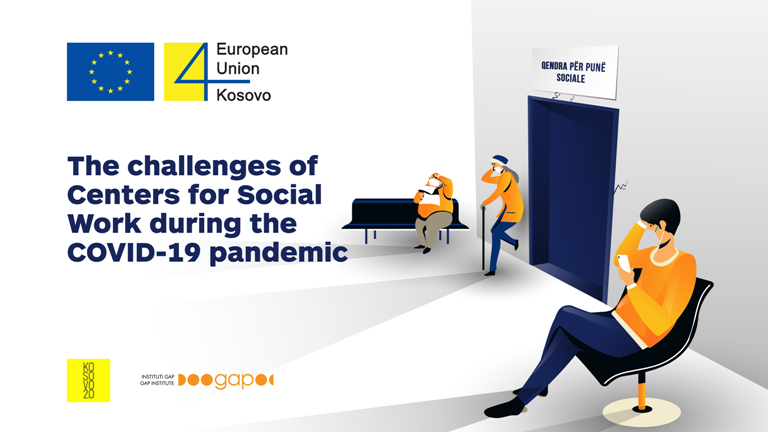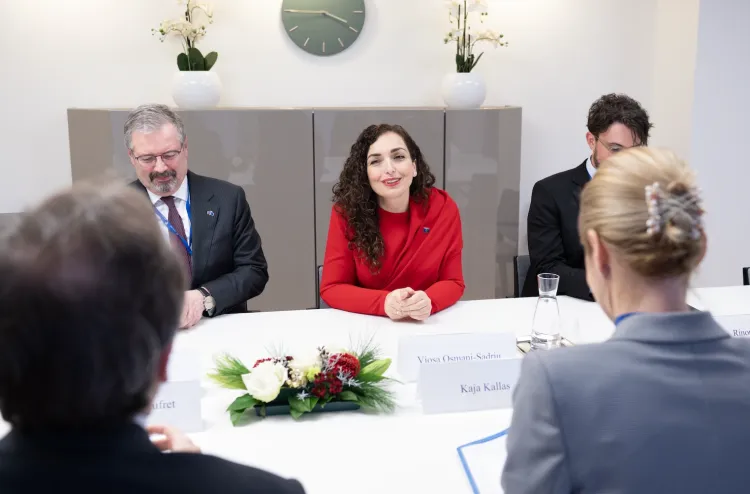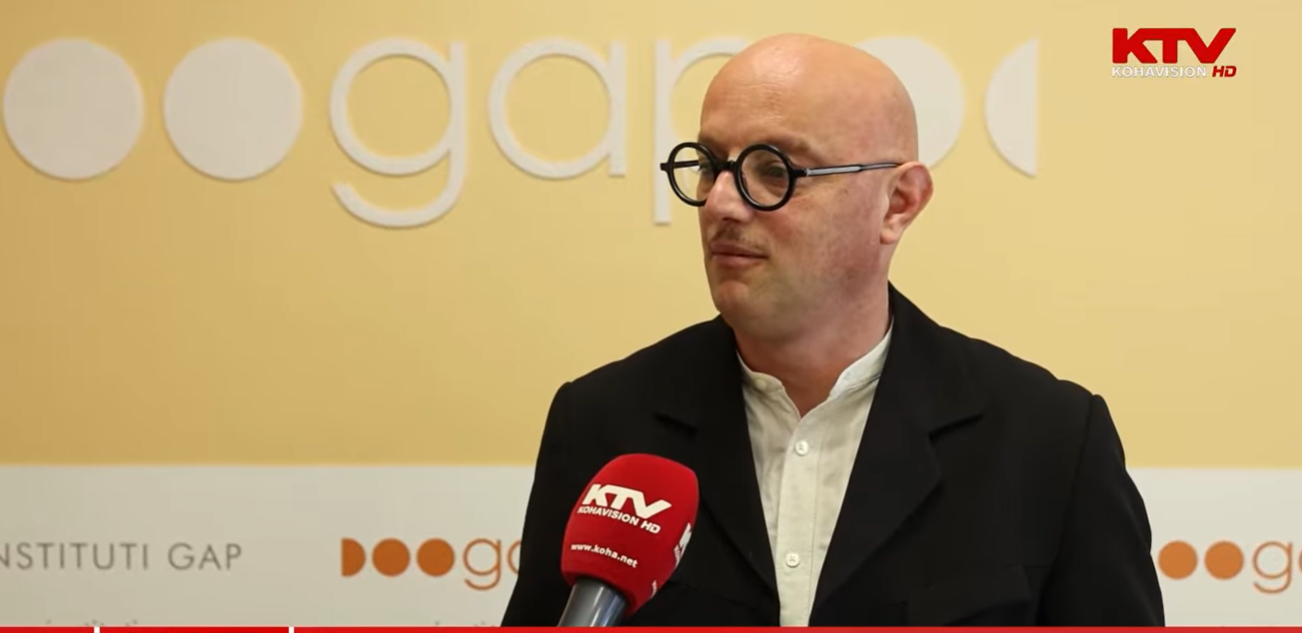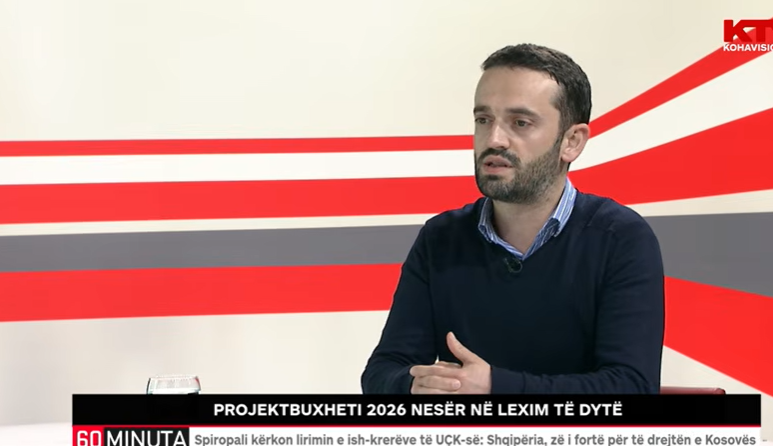Challenges of Centers for Social Work in Kosovo during the COVID-19 Pandemic
12/02/2021
This research was conducted by Korab Mala, within the Mentoring Project supported by the European Union and implemented by Kosovo 2.0 and GAP Institute.
Executive Summary
This report presents the operation of the Centers for Social Work (CSW) in Kosovo during the COVID-19 pandemic, more specifically during the period of lockdown, from March to June 2020. With the restriction of access to health, education and employment as a result of measures to prevent the spread of the pandemic, the need of citizens for social services increased. The most significant problems encountered during this period included access to financial assistance, maintaining of mental health and addressing the cases of domestic violence.
Hence, this research focuses on challenges faced by these centers, in offering social services during the pandemic. The number of staff in the CSW, their expertise and professional training, maintaining of contacts with beneficiaries of social services, access of social workers to technical resources, legislation and funding are some aspects of the CSWs, whose operation has been put to test as the result of the pandemic. The conclusions of this report point to some shortcomings of the CSWs and the steps that need to be taken in order to improve the legal and technical infrastructure of these centers.
Introduction
The hierarchy of institutions that provide social services or are committed to social welfare in Kosovo starts from the Ministry of Labor and Social Welfare (MLSW) - Department of Social Welfare, Municipal Directorates for Social Welfare and Centers for Social Work (CSW), thus forming the central and local level social services. This hierarchy is regulated by the Law on Social and Family Services.
MLSW regulates the provision of social services and ensures equal access to those services. The Ministry also develops policies and prepares strategic plans for the provision of social and family services in Kosovo, ensuring that those plans are implemented at the municipal level by directorates and centers for social work. In cases of suspicion of the public on the quality of social serviceoffered, MLSW establishes an investigative commission which conducts its work publicly and publishes its conclusions and recommendations.
The Department of Social Welfare operates under the auspices of this ministry, and prepares administrative instructions and directives. This department may process complaints related to social and family services and offers suggestions and advice to the Ministry and the Government of the Republic of Kosovo regarding the development of policies related to social and family services. Municipal directorates on the other hand, provide social services within their territory, by engaging CSWs and non-governmental organizations through annual funding.
Centers for Social Work are public institutions established at the municipal level, with a staff trained and qualified to provide relevant services. The activity of these centers includes direct provision of social care and welfare, including counseling and financial assistance of cases of persons in social need within the territory of the municipality. The Centers for Social Work have a Council of Experts, consisting of the social workers employed therein, or as they are otherwise known in the Law on Social and Family Services, social service employees. This Council organizes the CSWs and their branches, gives proposals regarding the professional difficulties encountered and prepares additional vocational education.
Up to 2009, the CSWs were under the administration of the MLSW, while in 2009 the decentralization process took place and the competencies for social services were transferred to municipalities, and are financed through the general grant the municipalities receive from Ministry of Finance. There are 40 Centers for Social Work Kosovo-wide with about 400 social workers (INTERVIEW with Mentor Morina, Ministry of Labor and Social Welfare).
In addition to CSWs, MLSW also manages community houses, which provide services to the elderly and people with disabilities. Community houses also fell under the competence of the ministry, however after 2016 they were also transferred to municipalities, and are funded from the central budget with the approval of MLSW. Three other institutions related to social services under the administration of MLSW include the Nursing Homes in Prishtina, Shtime Special Institute and the Children Disability Home in Shtime.
In addition to the institutional line, MLSW also regulates the non-governmental sector in terms of provision of social services. Since 2013, its department has been licensing non-governmental organizations for services not provided by MLSW, such as accommodation of victims of violence and daycare services. According to 2019 Ombudsperson Institution report, due to lack of professional staff, supervision, financial planning and advancement of services in accordance with the needs of municipalities, CSWs have been transformed into administrative-technical units.
The need for CSW services has become more apparent in times of the COVID-19 pandemic, when social inequalities have only deepened. In this context, this report aims to analyze how much the Centers for Social Work managed to be operational during the pandemic, what challenges they have faced and how much services they have provided to citizens during this time.
Challenges of Centers for Social Work during the Pandemic
From the very outset of the pandemic, the CSWs have faced numerous requests from citizens. During the period of lockdown, a specific task of the CSWs was to implement Measure 15 of the Government Emergency Package, which involved collection of documentation of persons who were not employed and provision of financial assistance to them. This has forced the social workers to exercise a role outside of their remit. Around 68 thousand applications to benefit from this scheme were received, of which around 27 thousand families benefited with 130 Euros each for the months April-June 2020 (interview with Mentor Morina, Ministry of Labor and Social Welfare). Another challenge for CSW employees has been the complaint process. In August, the CSWs received around 11 thousand complaints, a large number thereof related to failure to update information in the civil registry, excluding these persons from the beneficiary schemes.
In addition to the need for financial assistance, during the pandemic the need for other social services has increasedin Kosovo as well. However, due to social distance, social workers were unable to maintain most contacts with social service beneficiaries, only over the phone, except in emergencies such as domestic violence, or abandonment of a child.
Another challenge included the lack of adequate staff. The pandemic has increased the need for psychological treatments. However, due to the lack of psychologists in the CSW, this service was largely not offered. Domestic violence, mainly against women, has been pronounced during the pandemic. Only between May-July 2020, 77 cases of domestic violence were reported to the Center for Social Work in Prishtina (interview with BlerimShabani, Center for Social Work in Prishtina).
At the same time, CSWs have been forced to work with reduced staff, like many other public institutions.A number of CSW staff have been affected by the coronavirus and some have been released from duty due to older age. Infection of social workers occurred as a result of their exposure while assisting cases in the police, 24-hour dutyshifts or even as a result of parties gathering in their offices.
The reports of the municipal directorates to the MLSW showcase that the requests of the CSWs relate to the lack of budget for emergency interventions, building of technical capacities such as vehicles for field work, as well as the inadequate treatment of social workers for the work they do. However, MLSW aims to increase the number of social workers through the Law on Social Services and the Law on Local Finances, especially considering the lack of some profiles and old age of its current employees.
The Need for Capacity Building of the Centers for Social Work
Ombudsperson Institution Annual Report finds that there is a lack of supervision, planning, funding and advancement of services corresponding to the needs of municipalities. The Ombudsperson has also drawn attention to the restriction of provision of social assistance for children under the age of five, in the Law on Social Schemes in force, but this issue still remains pending.
According to MLSW, this issue is expected to be resolved in 2021, with some of the social assistance reforms envisaging the removal of criterion of children under the age of five. According to MLSW one of the main challenges is the issue of funding. By amending the Law on Local Finances, this ministry proposed the creation of a special grant for social services, which would enable municipalities, in this case the Centers for Social Work, to have a certain budget, based on a recommendation of the Grants Commission,on funding social services.This would provide a minimum funding recommended by the central level and the Grants Commission, to be used for provision of social services (interview with Mentor Morina, Ministry of Labor and Social Welfare).
In addition, European Commission report on Kosovo for 2020 also presents some remarks regarding the necessary legal changes to the social services framework. One change that needs to take place is the allocation of funds from the general grant for social services through changes in the Law on Local Finances. Also, the Law on Fight against Domestic Violence should be harmonized with the new Criminal Code, while the Strategy for Protection against Domestic Violence and the Action Plan 2016-2020 should be implemented. The European Commission also recommends CSWs to be more inclusive, as total social protection expenditures amount to only 6% of Gross Domestic Product (GDP), primarily for old-age pensions and war veterans.
According to the Institute for Social Policy Development, other needs of the Centers for Social Work include creation of an accurate structure of CSWs, detailing of the staff needs, service profiles should be proportionate to the number of residents and the capacity for training of professional staff should be increased so that students in this field are ready to take the job and treat cases (interview with VebiMujku, Institute for Social Policy Development).
Conclusions
During the COVID-19 pandemic, the most operational sectionwithin the Centers for Social Work included the Social Assistance Section. The Services Section operated only when addressing emergencies, such as domestic violence or child abandonment. This has made victims of domestic violence be the only beneficiaries of accommodation services during the pandemic.
Social workers do not have favorable work conditions, ranging from a lack of technical resources such as field vehicles, to even those more basic ones, such as means of communication. All these affect the effectiveness of social workers, not to mention the large number of cases they handle and the lack of safeguards, putting their health in jeopardy.
CSWs not only continue to lack staff but there is also a prevailing lack of professional training of existing staff. One of the reasons for this includes the lack of quality education in the relevant fields of higher education. On the other hand, the lack of funds for the proper delivery of social services and the discrepancies between the drafting of legislation and its implementation,stillpose challenges for CSWs.
This report has been published within the first cycle of the Mentorship Program which aims to enhance research and writing skills for young researchers and journalists through the mentoring by senior researchers and journalists at GAP Institute and Kosovo 2.0.
The report has been published with the assistance of the European Union. The contents of this publication are the sole responsibility of GAP Institute and Kosovo 2.0, and do not represent the views of the European Union.The EU funded project "Innovation for resilient media and citizen engagement" is implemented by: Kosovo 2.0 and GAP Institute.
The report is also available in Serbian language, please write at info@institutigap.org.
Korab Mala studies social work in the philosophy faculty at the University of Prishtina. He is active in different projects at the faculty and civil society organizations. Currently, he is voluntarily engaged as coordinator of the Ethics Club at the Faculty of Philosophy — a non-formal student group. These engagements have helped him identify different causes he wants to be dedicated to in the future, such as social housing policies and the quality of education in the Department of Social Work at the University of Prishtina.















